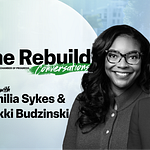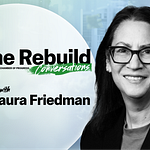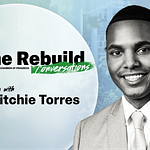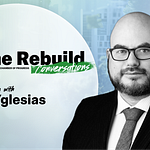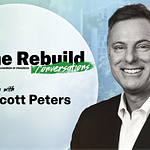In this episode of The Rebuild, we spoke with Congresswoman Brittany Pettersen of Colorado’s Seventh District about the economic and structural challenges facing young families today and what it will take to make America more family-friendly. Our conversation explored how rising costs of childcare, housing, and everyday necessities are shaping family decisions, why stronger federal support for working parents is urgently needed, and how Congress itself should evolve to reflect the realities of modern family life. We also discussed the broader need to rebuild public trust, invest in affordability, and restore stability to our political system so that future generations can thrive.
Tahra Hoops: Hi everyone. Welcome to the Rebuild. I’m one of your hosts, Tara Hoops, joined with Gary Winslet, and today we have an incredible guest joining us, Representative Brittany Pettersen.
She represents Colorado’s seventh district, elected to Congress in 2022, and previously served in both the Colorado House and State Senate where she led on issues like education, mental health, equal pay and support for working families. She’s also one of the few young moms in Congress, bringing a deeply personal perspective to the challenges of raising a family today.
We’re so excited to have you. How are you?
Rep. Brittany Pettersen: Yes. I’m so excited to be here. I’m doing as good as you can be in these crazy times. How are you doing?
Tahra Hoops: You just summed it up. Every day I am just like: just get through the end of the day.
Rep. Brittany Pettersen: I know. I’m like, focus on the issues we wish we were working on at the federal level.
Tahra Hoops: Exactly. Yeah. That’s the importance of having state reps and even on the local level, so you’ve completely nailed it. But, I wanted to start us off on a recent piece that I wrote this week on our Substack talking about young families and how they’re actually delaying expanding their families.
Some people on the right are saying people are not having kids anymore because this is a cultural issue. My argument was more so that it is financial. Of course, there are always many circumstances that add to the issue, but for me, affordability seems central… housing costs, student debt, healthcare, especially childcare.
Do you think these economic pressures are the big reasons why family formation is slowing, or do you think there might be larger factors at play? And what can we do to make it feel possible for people to feel secure, to have a family?
Rep. Brittany Pettersen: Yeah. fundamentally this is a choice that people should have. They should have access to birth control and reproductive healthcare to be able to choose if and when they wanna start a family. And then we should have childcare and make sure that we’re paid for doing the same job as our male counterparts and that we can actually afford as women, and as families, to take on having children.
So I think that they just look at this fundamentally in all of the wrong ways. And this is about giving us that choice, economic freedom, reproductive healthcare, and making sure that we can actually afford and have a place to send our kids where they’re safe, where they can go for childcare in early childhood education, and then education at large.
Gary Winslett: So you’ve talked pretty candidly about your own experiences bringing your newborn to Congress because there’s no real accommodations for new parents. I super sympathize with that ‘cause I have a 6-year-old and so I just remember always like juggling the work and family stuff.
My kid is actually watching Odd Squad on the other side of the room right now. Totally get it. I’m just curious, what reforms would you like to see both in congress and in workplaces more broadly to make America more family friendly? Does it mean baby bonuses or paid family leave, or a bigger child tax credit or something else?
What do you think would help make this easier for parents?
Rep. Brittany Pettersen: First of all, in order to actually pass policies that are gonna address the challenges that families face, we need people in Congress who understand what families are going through. Oftentimes so many people are out of touch because of the money and background that they come from that is not reflective of most Americans. Especially not currently going through the difficulties that so many families face with lack of access to affordable childcare, with rising costs of housing, groceries, and everything else. I think it’s really changing the systems so that it is more accessible. Part of that is making sure of the very small step that we were trying to make when I was pregnant… passing a resolution to update our rules so that if you recently gave birth or if there’s a medical reason while you’re pregnant— because you can’t fly close to your due date, for example, so if you have reasons for being away you still have your vote represented remotely. That was a small step that we couldn’t, we had overwhelming bipartisan support and the speaker shut us down every step of the way, even though we forced a vote through a discharge petition. That was a small step forward.
But we need to change the way Congress is set up. Our schedule is not accessible for families. If you’re expected to be in your district and also in DC to vote... there are ways that you can set that up where you can maximize your time in DC and not be away from your family as much. There’s a lot of things that you can do to support people there that make it much more family friendly. Fundamentally though, there are just people that don’t think that individuals like me should serve in congress. I should be home taking care of children. I can’t believe the backlash that I got online from right wing folks. You know this ‘cause you have gone through it, but nobody will take your kid when they’re under three months old because of the liability issue.
Plus, we were on a wait list for over 13 months as soon as I knew I was pregnant until my son, Sam, finally had a slot. So he had to go to Washington with me. Whatever I was doing, he was with me. Whether that was spending 24 hours at the Capitol and sleeping overnight there to not miss votes. Sam was in it with me because there were no other options. And while I had unique challenges as a member of Congress, this is what families are going through every day. I don’t even live in a childcare desert and it still took me that long to have a spot open up. We need system changes in Congress. We need to pass paid family leave for folks. We need to make sure that women are paid their value. There’s so much that we can do to invest in our kids, to invest in regular people and reduce costs for working families that makes it more attainable to pursue starting a family.
Gary Winslett: I wanted to ask you about those slot constraints. ‘Cause like every new parent I know goes through this. We went through it, you clearly went through it. Everybody has this thing where it’s like… you apply to like nine daycares and you may get into one of them. You may be on a long wait list.
So I’m just curious, what do you think we could do to maybe alleviate that a little bit?
Rep. Brittany Pettersen: Oh, there’s a lot that we can do. So… pandemic dollars when they were coming down federally, thank goodness Democrats were in charge during that crisis… When I was in the State Senate, we were able to oversee massive amounts of federal dollars that were trying to keep services and businesses afloat through such a challenging time. I was part of a bipartisan group that invested in the infrastructure and upfront costs of creating childcare facilities and meeting our regulatory standards, investing in workforce and loan forgiveness programs.
We have really high standards for people who are going into early childhood education. They have to come out with a degree and then we pay them nothing when they’re there. So we need to incentivize people to go into these fields and we need to also help support the education process and the cost of that. We also need to diversify in, and I’m getting a little in the weeds I know, but... we need to diversify the types of opportunities that we’re creating. So, the United Way in Colorado, a nonprofit, goes in and actually trains women in child desert areas on how to start their own childcare center at their house and how to do that safely. You’re changing generations of opportunity. You’re not only filling a local gap, you’re creating these small business owners, you’re changing the opportunities for their kids. So we need to look at friends, family and neighbor programs and how we actually develop that and that support system.
But then we also need to invest in a big way. When you talked about the child tax credit, that was the number one most effective thing that congress has done to reduce childhood poverty, so we need to make sure that that is permanent. They just cut a bunch of taxes for the most wealthy individuals on the backs of working families. We need to make sure we’re investing in regular people and [the child tax credit] would help families address rising costs, it would help them address childcare costs. And then I think we could get into what we’ve done in Colorado through taxes, and I think that we could do this as well. You would qualify universally to help with some assistance, so you could have a match at the federal level, for example, to help people in the most vulnerable time when their family is the most likely to struggle financially and when it is the most expensive to support your needs to get your kid in a safe place and then you being able to actually go into the workforce.
Tahra Hoops: You mentioned the one big beautiful bill, which, I still can’t get over that name, but I really do find it shocking that it was just like a reverse robin hood, like you just cut our social safety net— taking away healthcare and SNAP benefits. These are kids who are just hungry and yet the idea is that we need to lessen that so that the top 1% can get a larger tax break was like so shocking to me that to this day, I was—
Gary Winslett: While raising taxes on imports.
Tahra Hoops: Yeah. Exactly. All while having tariff-palooza every single day since April 2nd. And I sometimes worry that our messaging there, because it wasn’t so concise and strict, it felt like it fell deaf on people’s ears.
Like I wanted to ask you like. Obviously passing affordability policies is something that we’re always going, and need, to do, and it should be a priority. I’m a big proponent of the child tax credit, that should be a no brainer. But what do we do to make sure families actually trust the results they’re going to feel in their daily lives? What is the messaging that can reach the average person to say Hey, we Democrats did X, Y, and Z, and we want to be there to protect that while the GOP was off doing god knows what.
Rep. Brittany Pettersen: Yeah, I think it’s the biggest challenge right now because these are, when it comes to issues, things that we represent and fight for are very popular. When I was in the legislature, the bread and butter issues that we worked on, the things that we would point to when we had split chambers that the Republicans would kill, we would point to [and say] Hey, this is what we would do for you if we were in charge. And ultimately we were able to do that and we delivered in very meaningful ways.
I think that it’s difficult because at the federal level these are complicated issues. We were talking about the things that we wanna do to make a difference in people’s lives, but we haven’t had the opportunity to be in power for enough time to get enough done. I think that people could feel it. And then, during the Biden administration, we infused dollars that saved our small businesses, that saved our economy… the quickest, strongest recovery in the world. And instead of hearing that— all [people] heard were Democrats: rising costs. Democrats: inflation. It was just consistent. They have very simple messages and it stuck and people forgot where we had come from and what we had overcome and how we got here. So we definitely have to do a better job at messaging.
I think the thing that I get the most frustrated about is we talk a lot about [people] paying their fair share of taxes. Okay, sure. But it’s not just that. It is about what that means for people. It’s not just about fairness, it’s about what you do when you tax people. When you have a fair tax system, people like Elon Musk do not exist because the amount of wealth that one person holds should be impossible if you have a fair tax system that’s investing back in each other, and what it means to reduce costs and increase opportunities for regular people. We’ve seen every single decade, the opportunities that I had growing up continue to dwindle and it’s because of the priorities of the most wealthy individuals on the backs of working families, and it’s going to get even worse. The big ugly bill is the largest wealth transfer from working class families to the most wealthy individuals in the history of the United States.
It is unfathomable. So we need to talk about what it means to level the playing field, what it means when you have access to high quality schools, when you can send your kids to childcare at an affordable rate, when you don’t have rising costs on groceries and everything else, when you’re actually investing back in each other… it reduces costs, it increases opportunity, and it is about investing in housing and the things that you all talk about. So, we need to get back to connecting why fair taxes matter to people’s lives and how that reduces costs.
Gary Winslett: So you just mentioned housing and earlier you had mentioned your time in the state legislature in Colorado. I wanted to ask you about that, because we all know we need new housing, but anytime you try to do that, you get local opposition. I’ve read about some of these Colorado ski towns where the workers have to live 45 minutes, an hour away, because the locals with money don’t wanna see any new housing go up around them. And so I’m just curious, like what are your thoughts on how we streamline housing production and get around some of these red tape barriers in Nimbyism to actually get more affordable housing built?
Rep. Brittany Pettersen: The picture that you just painted couldn’t exemplify more the growing inequality in this country. We have people throughout the rural parts of my district and throughout Colorado where they have enormous homes that they might be in only two weeks out of the year. And it stays vacant.
People can’t afford to put a roof over their head and live in that community where they work. and you have many people who are holding homes that they barely visit, couldn’t be more reflective of how far off we are in this country. But I think that it’s about bringing the incentives at the local level. It’s about trying to build houses and invest in new technologies that can build them quicker and cheaper. I visited the first 3D printed home in Chaffee County. It’s the first one in Colorado that was printed and it’s an example of what’s possible as we’re in this new technological age and how we take advantage of that. But we also have a housing facility that tries to build houses like we do cars and they do it inside a warehouse. They do it so you’re not restricted by the weather and what’s happening outside.
And they can actually do mass production of homes at a much cheaper rate, but they have regional restrictions ‘cause you can’t take ‘em over highways, you can’t take ‘em through mountain ranges. You have to build these things regionally and they’re very expensive to start. So we need to invest in things like that that are going to bring massive amounts of houses across the United States, the tax incentives for builders to build the type of homes that we need.
And then we need carrots and sticks for local communities who don’t wanna address the needs of their community. So, we’re trying to work on legislation at the federal level, but we’re definitely not doing enough at the federal level.
Tahra Hoops: You mentioned manufactured housing and Gary’s eyes lit up. He recently had a paper on manufactured housing. So Gary, if you’d love to give us an overview…
Gary Winslett: So it’s funny ‘cause Mass Timber works this way too, where you mostly do the manufacturing offsite and then onsite you almost put it together like a Lego set. So there’s a new mass timber apartment building that went up in Minneapolis last year that went up in under three months, which is just lightning compared to traditional construction techniques.
So yeah, I’m actually really excited about some of these new housing technologies. Technology makes everything better over time, why can’t it do the same thing to housing? Our cars are better than they used to be, why can’t our houses also be better and cheaper to build?
Rep. Brittany Pettersen: The place I was referring to in Chaffee County, Fading West as a company, their houses, they don’t look like manufactured homes, they’re beautiful. I would love to live in one of those. I think that’s a perception of what they would be in your community and being resistant to that. But, they definitely don’t have to be.
Tahra Hoops: As we’re being forward looking discussing the future, it’s something that comes to mind. We’ve talked about your son, I think you might have two sons. Is that correct?
Rep. Brittany Pettersen: Yes. I have a five-year-old who just started kindergarten and I have an eight month old. So Sam is the one that, my eight month old, that everybody saw me on the house floor with.
Tahra Hoops: The star of the show. Yeah. I wanted to ask you, as you’re a freshman in Congress, you’re seeing the inner workings like no one like constituents don’t ever see. What is something that you would like to see, you would want your son to see in the way that government works by the time he’s grown up?
What changes structurally, maybe even small, would you like to see happen in the next 20 years or so?
Rep. Brittany Pettersen: Oh my gosh. Everything changing? I sometimes feel like I should be doing videos for constituents on trying to educate people about what’s happening in Washington... ‘Cause the conversations I have with [my five year-old] to update him about what’s happening and why, and, I feel like people need that one-on-one back to basics again, because it is just such a disaster. I think that we’re on the brink of another government shutdown right now. This is not the way that a superpower can continue to lead the world, continue to keep our country safe, and address our urgent needs.
My hope is that one day we can have a functioning government that no matter who is in charge, we don’t have these enormous pendulum swings and we can agree that there are functions of government that are very important— like keeping us safe, our national security, clean air, clean water, addressing rising healthcare costs, creating the incentives at the federal level to reduce costs for folks. I mean, I’m so shocked every day at the amount of damage that is caused where it’s not like during the pandemic where we were dealing with something that we couldn’t control, it was this terrible global pandemic that we had to get through, keep our country afloat, what we do to ourselves because of the dysfunction at the federal level, the amount of money that is invested elsewhere because the United States doesn’t look stable anymore. The standing that we’ve lost in the world and the economic impacts that the Republican chaos is gonna cause, has already caused. We already lost over a million jobs since January across the United States, and it’s only going to get worse. These are all things that we did to ourselves. So I hope we can do the basic functions of our jobs, and I hope that it takes much less than 20 years, and I have, of course, bigger aspirations, but if we could do that, we could actually focus on addressing those long-term challenges.
Tahra Hoops: That’s something that we joke about on The Rebuild is like getting the basics to work again. It sometimes it feels like it’s gone a bit too awry where we just wanna stop and make sure that our foundations are stable because right now it doesn’t seem so. And as you keep building on unstable foundations, everything starts to crack even larger.
Now you just have like this big muddled mess around you. So, for the sake of our future generations, for the sake of my future life, I hope that some of the things that you said could actually come to fruition.
Rep. Brittany Pettersen: Yeah, I mean, I can’t believe what a disaster we’re seeing at the federal level and the impact that the economic pain it’s gonna cause. When I look back at my life during the nineties— we had no debt, we were doing pretty well. I look back at my childhood and no matter what individual struggles I had, our country was in a pretty good spot. I hope that we get to rebuild the middle class again. It’s with people who are struggling economically and with the lack of opportunity where you start to be ripe for extremism. And that’s what we’re seeing on the right and the left.
Gary Winslett: Yeah. I think we have time for one more question. So as our listeners are aware, The Rebuild is a Substack that focuses on how Democrats can get back to being the party that focuses on cost of living to help people who are struggling. So we always like to wrap up with a couple rapid fire questions.
What is something you think is too expensive?
Tahra Hoops: Don’t say housing.
Rep. Brittany Pettersen: Diapers... formula... definitely housing.
Gary Winslett: Yeah I totally get it on the diapers and formula. I just remember how absurdly expensive a new baby felt. It was unbelievable.
Rep. Brittany Pettersen: Oh my gosh. And yeah, childcare. Our childcare costs almost as much as our mortgage.
Gary Winslett: It’s incredible. I think people who don’t have kids in daycare just don’t [understand]. It’s incredible.
What’s an innovation that you believe is overrated?
Rep. Brittany Pettersen: An innovation that is overrated... social media? I don’t know. When I look at the damage being done with algorithms and extremism and the radicalization of individuals... I am really concerned about social media.
Gary Winslett: And then the last one. So I have this kind of unorthodox idea that it would be really great to get the federal government to put a moratorium on local localities subsidizing big sports stadiums. ‘Cause we know that the economics of it are terrible, but you feel stuck that the team’s gonna leave if you don’t hand over all this money for a billionaires’ sports stadium. So I’m just wondering if you have any of those kinds of unorthodox policy ideas.
Rep. Brittany Pettersen: I don’t know. I’ll have to think about that more.
Tahra Hoops: It could be an absurd one, like nothing that you actually have to pass. We won’t know you do it…
Rep. Brittany Pettersen: Nothing’s coming to mind at the moment.
Tahra Hoops: My absurd policy idea is that when it comes to concert ticket sales— I think they should have access to either your Apple Music or your Spotify, and the people who listen to that artist the most should get priority in buying those tickets. This is someone who has PTSD of trying to go to the Eras tour, and it was a bloodbath out there.
Rep. Brittany Pettersen: Oh, I bet. Something that we passed in Colorado… when we connect taxes to services, is that if you’re asking to reduce taxes you have to identify the top things that will be hit… top services, and it has people think about that tax cut. So I think that we should do that at every level of government: if you want a tax cut, you have to be able to communicate on the ballot about what that means for constituents when they’re voting on it.
Tahra Hoops: Oh, I like that. It leads to more transparency as well.
Well thank you again for meeting with us. This has been a great conversation. We’re loving the work that you’re doing and we hope to see more of you. Thanks for making the time to be here.
Rep. Brittany Pettersen: Yes. Thanks so much for having me.






